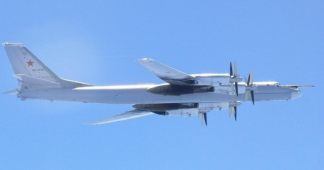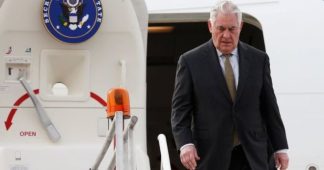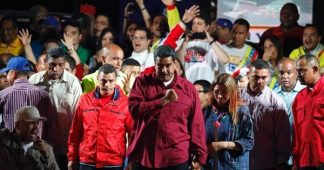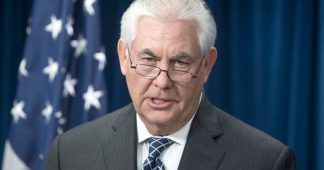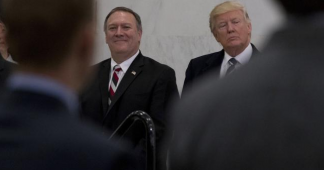The brief deployment of two Russian Tupolev Tu-160 ‘Blackjack’ strategic bombers to Venezuela last week became a sensational event. Indeed, it is a display of the growing Russian military prowess that has been restored under President Vladimir Putin’s watch. Blackjack has appeared on the Syrian skies more than once and lately flew past Alaska. Now it crosses the Pacific.
The two nuclear-capable bombers landed in Venezuela on December 10. The Tu-160 Blackjack is a supersonic, variable-geometry heavy bomber, designed to strike strategic targets with nuclear and conventional weapons deep in continental theatres of operation. In a manner of speaking, Moscow gave Washington a “preview” of the world of tomorrow if the US proceeds to tear up arms control pacts and tries to shift the global strategic balance in its favor.
To be sure, the scrapping of the INF Treaty by the US opens the door to American deployments of intermediate range missiles targeting Russia from the European part as well as the Far East. Putin has said that Russia will respond adequately to meet the American challenge.
Washington got the message alright. Secretary of State Mike Pompeo tweeted, “The Russian and Venezuelan people should see this for what it is: two corrupt governments squandering public funds and squelching liberty and freedom while their people suffer.” The Kremlin promptly reacted that Pompeo’s remarks were “unacceptable” and “highly undiplomatic for a secretary of state.” Spokesman Dmitry Peskov said the US has no business criticizing the money being spent on the drills, saying just half of the US defense budget could feed all of Africa.
The influential Russian daily Nezavisimaya Gazeta reported on Wednesday that the mission of the Tu-160 strategic bombers might have something to do with a Russian plan to establish long-term military presence in the Caribbean. The daily hinted that this topic figured during Venezuelan President Nicolas Maduro’s recent visit to Moscow. Interestingly, the two Russian strategic bombers also carried out a 10-hour exercise in the Caribbean, accompanied partly by Venezuelan jets.
Venezuela is keen on maintaining close relations with Russia. During Maduro’s recent Moscow visit, agreements were signed involving $5 billion in new Russian investments in Venezuelan oil industry and $1 billion in mining, particularly related gold. (Venezuela is estimated to have the world’s biggest deposits of gold.) The Russian government and oil giant Rosneft are estimated to have lent Venezuela some $17 billion since 2006, which is a critical lifeline for the Maduro government. On the other hand, for Moscow the alliance with Venezuela is important, since both are big non-OPEC oil producing countries. At the meeting with Maudro, Putin made a veiled reference to the US’s regime change agenda toward Venezuela, saying that Russia condemned “any terrorism-related steps and any attempts to change the situation using force.”

The backdrop of US-Russia tensions also comes into play. The US has been taunting Russia in the recent period – drone attacks on Russian bases in Syria, the escalation of conflict provoked by Ukraine in the Azov Sea, Washington’s ultimatum that it will abrogate the INF Treaty with Russia, which barred both countries from developing and deploying short- and medium-range nuclear missiles, and so on. Over the past week to ten days alone, the US escalated military tensions by conducting an “extraordinary” overflight of Ukraine with a US Air Force surveillance plane. Pentagon blithely described it as a gesture designed to “reaffirm US commitment to Ukraine” and “the security of European nations.” Again, the US Navy sent a guided-missile destroyer into the Sea of Japan near the base of the Russian Navy’s Pacific fleet, the first time in the past 35 years since the height of the Cold War that such a thing happened. Meanwhile, Pentagon is preparing to dispatch another US Navy ship to the Black Sea off Ukraine.
Conceivably, the arrival of Russian planes in Caracas signals that Russia can also respond in kind. The big question is whether the Blackjack’s mission to Venezuela signifies a shift in the Russian strategic posturing as such. Two days ago, at a press conference, Maduro said his meeting with Putin was “the most useful meeting in my career. We strengthened the process of cooperation between Russia and Venezuela in the sphere of military-technical cooperation.” But then, Maduro was speaking to his domestic audience.
The Russian leadership has been carefully avoiding strategic overstretch of the kind that drained the resources of the former Soviet Union. Putin’s approach is to keep improving Russia’s deterrent power and prevent erosion in the strategic balance in a cost-effective way without getting into confrontations with the US, while advancing alongside his foreign-policy vision effectively. Putin has had an extraordinarily successful run so far.
Venezuela is mired in a profound economic crisis, largely stemming from US sanctions. What Russia (and China) can and should do is to support Venezuela through trade and investment (which they are, perhaps, doing already.) The setting up of a military base in the Caribbean cannot be a Russian priority. Having said that, Moscow has made a smart move by briefly deploying two Tu-160 nuclear-capable strategic bombers to America’s backyard (accompanied by an AN-124 transport aircraft and an Il-62 passenger jet, together with 100 pilots and other Russian personnel.) And it caught the attention of the White House that the Cold Warriors in the Administration are at their old game of poking the bear, and Russian patience is wearing thin. Interestingly, the White House intervened to clarify, “We have spoken with representatives of Russia and have been informed that their military aircraft, which landed in Venezuela, will be leaving on Friday and going back to Russia.”
These are extraordinary times in Russian-American relations. Moscow is grappling with the famous Kissinger question – “Who do I call if I want to speak to Europe?” The point is, there are multiple power centres in the Washington Beltway. The Kremlin spokesman Dmitry Peskov may have alluded to when he said earlier today that Moscow is still convinced that a summit meeting between Putin and Trump is “equally necessary for both.”
(This blog has appeared in Newsclick.)
Published at https://indianpunchline.com/russian-deployment-to-venezuela-served-the-purpose/

